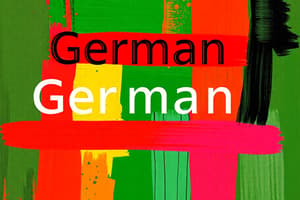Podcast
Questions and Answers
Which countries have German as an official language?
Which countries have German as an official language?
- Germany and France
- Both B and C
- Switzerland and Hungary
- Austria and Liechtenstein (correct)
German has three grammatical cases: nominative, accusative, and dative.
German has three grammatical cases: nominative, accusative, and dative.
False (B)
What is the term used for the standardized form of German used for official purposes and education?
What is the term used for the standardized form of German used for official purposes and education?
Standard German
The German language relies on a combination of cases and _____ for nouns.
The German language relies on a combination of cases and _____ for nouns.
Match the following German language aspects with their descriptions:
Match the following German language aspects with their descriptions:
Which aspect of German is considered to be complex?
Which aspect of German is considered to be complex?
German has simple spelling rules compared to other languages.
German has simple spelling rules compared to other languages.
Name one industry where the German language plays a significant role.
Name one industry where the German language plays a significant role.
Flashcards
German language family
German language family
German belongs to the Indo-European language family, specifically the West Germanic branch. It's related to languages like English and Dutch.
German Cases
German Cases
German grammar uses four cases: nominative, accusative, dative, and genitive. These cases determine the form of nouns, adjectives, and articles.
German noun genders
German noun genders
German nouns have a gender: masculine, feminine, or neuter. This influences the form of adjectives and articles that modify them.
German verb conjugation
German verb conjugation
Signup and view all the flashcards
Standard German
Standard German
Signup and view all the flashcards
German Cognates
German Cognates
Signup and view all the flashcards
German Dialects
German Dialects
Signup and view all the flashcards
German Orthography
German Orthography
Signup and view all the flashcards
Study Notes
German Language Overview
- German is a West Germanic language, spoken natively by approximately 100 million people.
- It's an official language in several countries, including Germany, Austria, Switzerland, and Liechtenstein.
- It belongs to the Indo-European language family.
- German grammar is considered complex.
- It uses a system of cases and genders for nouns, adjectives, and articles.
- German orthography (spelling) uses a complex system of rules.
Grammar
- German grammar uses four cases: nominative, accusative, dative, and genitive.
- Each noun is assigned a gender (masculine, feminine, or neutral).
- Noun gender affects the forms of modifying adjectives and articles.
- Verbs change form according to tense, person, and number.
- Distinct verb forms exist for each combination of tense, person, and number.
- Article and preposition usage depends heavily on grammatical case.
Vocabulary
- German shares cognates (similar words) with many Romance languages, like English, due to a common linguistic origin.
Dialects
- Significant dialect variation exists across the German-speaking world.
- Differences in pronunciation, vocabulary, and grammar are evident.
- Standard German is a standardized version used for official communication and education.
Writing System
- German orthography is complex, reflecting historical developments.
- Diacritics and letter combinations are used.
- Double consonants and letter combinations are common.
Modern Usage
- German is widely used in business, academia, and international relations, particularly in central Europe.
- It's understood and spoken extensively in many parts of Europe.
- German plays a key role in industries like engineering and automotive manufacturing.
History
- German history is interwoven with the cultural and historical development of central Europe.
- German has evolved significantly over time.
- Influences from various historical periods are reflected in grammar, vocabulary, and usage.
Studying That Suits You
Use AI to generate personalized quizzes and flashcards to suit your learning preferences.




